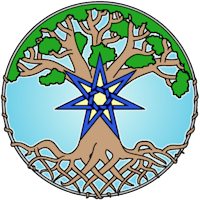This time, when I went to see Na Morrigna, they were gathered already around the cauldron and waiting for me. When I arrived, and handed over the bottle of wine, they poured it into the cauldron, stirred it clockwise, and then all three of them transformed into crows, and dove into the the shimmering water. I was pulled along with them, face first, and emerged through that watery portal to a vantage point on a cliff, above what appeared to be a large camp, with tents and people milling about. I was told to compose a poem describing what I saw, and to convey their message to my fellow devotees.
On a ridge above a war-camp
Stand the Morrignae and I
People stirring below
Awakening from slumber
Tending the wounded
Preparing to fight
Fairy Wars rage
Over Land, Sea, and Sky;
Humans also struggle
Against invisible enemies.
Do not give up the fight;
Your battles are not yet won.
The War lingers.
We fly as scald-crows over the camp
To the scene of yester-eve’s battle
To cleanse the dead who lie still.
Find joy in the calm moments
To fortify yourself for continued struggle.
You fight to protect what you value.
You fight to protect those you love.
I got the sense that the “invisible enemies” we are fighting against are both physical things that are too small to see (like the covid virus), but also abstract things like injustice, so you should read that with both meanings.
Also, I clearly saw the crows we became when flying over the camp, black and grey, and I also heard them say what sounded to me like “skald crow”, but I didn’t write that at first, because what does a Norse poet have to do with a hooded crow? Though apparently I’d misspelled it – “scald” crow is apparently another name for the hooded crows I saw, and that was a strange little moment for me. “Yester-eve” was almost “yesterday evening”, but I was told that was not smooth enough, and that this poem needed to be pared down to the sharpness of just the few most necessary words.
